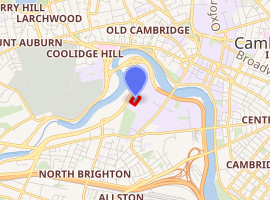Jordan Field
Jordan Field (formerly called Soldiers Field Soccer Stadium[1]) is a multi-purpose stadium on the campus of Harvard University in the Allston neighborhood of Boston. (Although the core of the Harvard campus is in Cambridge, the athletic complex lies within Boston.)
 | |

| |
| Former names | Soldiers Field Soccer Stadium |
|---|---|
| Location | Boston, Massachusetts |
| Owner | Harvard University |
| Capacity | 4,100 (seated) |
| Field size | 116 x 74 yards |
| Surface | FieldTurf |
| Opened | 2010 |
| Tenants | |
| Harvard Crimson men's soccer Harvard Crimson women's soccer Harvard Crimson men's lacrosse Harvard Crimson women's lacrosse New England Revolution (Some U.S. Open Cup games) | |
It first opened in September 2010 and replaced Ohiri Field as the primary home of the Harvard Crimson men's and women's soccer teams.
It hosted a 2010 playoff match for the Boston Breakers of the Women's Professional Soccer league due to conflicts with the team's former primary home, Harvard Stadium.[2]
In June 2013, the New England Revolution played host to the New York Red Bulls in a US Open Cup Round-of-16 game, marking the first time in Revolution history the team played a game within the Boston city limits.[3][4]
Renovations were completed in early 2015, and it was the official home stadium and training venue of the Boston Breakers from 2015–2017.[5]
Footnotes
- "JORDAN FIELD – Boston Breakers". www.bostonbreakerssoccer.com. Retrieved November 11, 2015.
- "Breakers keep eyes on prize". Boston.com.
- "New England Revolution vs New York Red Bulls 06-12-2013 – Recap". MLSsoccer.com. Archived from the original on June 16, 2013.
- "Revolution sacrificing home-field advantage at Harvard?". Boston.com. Retrieved November 11, 2015.
- "Breakers announce Soldiers Field Soccer Stadium as new home for 2015 NWSL season – Boston Breakers". www.bostonbreakerssoccer.com. Archived from the original on September 23, 2015. Retrieved November 11, 2015.
External links
- Soldiers Field Soccer Stadium. Men's Soccer. Harvard University Athletics official website